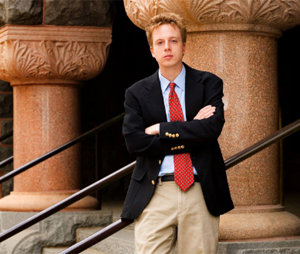24 Sep 13 | Campaigns, Press Releases
What is actually happening?
Following initial revelations in The Guardian by whistleblower Edward Snowden, reports by international media organisations, including the New York Times and Washington Post, have revealed that the US, UK and other countries’ governments have been carrying out mass surveillance of both meta data and content by tapping into communications cables. This means that governments are gathering and storing data about your phone calls, emails, texts and search and browsing history. They have the ability to access passwords as well as the actual content of emails, text messages and online chats. It is still not known how long this data is being stored for. Gathering and storing information in this way and on this scale is an attack on our right to privacy and a threat to our right to free speech.
Which governments are carrying out mass surveillance?
Most newspaper reports have concentrated on mass surveillance by the US government’s National Security Agency (NSA) and the UK’s Government Communications Headquarters (GCHQ). However, there have also been revelations about France, Germany, Sweden and the Netherlands.
Why is mass surveillance wrong?
Mass surveillance of private communications is an attack on our right to privacy and our right to free speech. Gathering data from entire populations is unlawful under human rights law as it violates our right to privacy. It also threatens free speech. How can we speak freely if our confidential emails, texts and chats are being read?
Is all surveillance wrong?
No. Governments and the police may need to carry out targeted surveillance to try and prevent crimes, including terrorist attacks. However, there need to be legal safeguards to prevent abuses of power and to hold those gathering information to account. There should also be transparency about how data is gathered, stored and used.
Surveillance should be targeted towards people who are suspected of planning or committing a crime, not entire populations. Usually decisions about who should be targeted by surveillance should be made by an independent body or by judges.
I haven’t got anything to hide so why should I be worried about mass surveillance?
Governments say that if you aren’t doing anything wrong, you have nothing to worry about. In reality, restricting our human rights threatens the freedom and security that the same governments are claiming to protect.
Mass surveillance can be used to target activists, such as environmental groups, who are critical of government policies. Activists and opposition groups and the media should be able to hold governments to account without having their communications monitored.
Mass surveillance can also be used to monitor and threaten investigative journalism, threatening the anonymity of sources and potentially exposing lines of investigation. This in itself threatens the freedom of the press.
We all have a right to privacy and the state should not interfere in our private communications. After all, you wouldn’t want the government reading your letters, so why should they read your emails?
What can I do?
Sign our petition calling on the EU’s leaders to end mass surveillance. Share it with as many people as possible so that we can put pressure on the EU to take a stand.
What can the EU do about it?
Mass surveillance must be on the agenda when EU leaders meet in October. Firstly, the EU’s leaders need to condemn mass surveillance by the US, UK and other European governments. Secondly, they need to take joint action to stop the mass collection of data about European and other citizens.
Can I sign the petition if I am not an EU citizen?
Yes, and please share with friends outside the EU. We want people from around the world to come together to say no to mass surveillance.
This article was originally posted on 24 Sept 2013 at indexoncensorship.org
24 Sep 13 | Campaigns, Events, United Kingdom
The possible consequences of using social media should be taught to children as young as 10, although who should be responsible for doing so is still unclear. This was one conclusion from “Speak now: Regret Later?”, a Social Media Week event where as a specialist panel discussed how young people represent themselves online and what implications this may have on their future employability options.
A collaboration between Index on Censorship, The Student Journals and Youth Media Agency, the discussion was chaired by Index CEO Kirsty Hughes, with Asa Bennett, Huffington Post business reporter, Maya Wolfe-Robinson, commissioning editor on Guardian law and Comment is Free, and Siraj Datoo, co-founder of The Student Journals, making up the panel.
The majority of the audience who engaged in the discussion, all under the age of 25, felt they had evolved with the changes in social media and adapted their privacy settings and self-censored accordingly. This quickly lead the debate on the floor to progress to the question of the next generation of social media users; how should they be taught about the possible implications of what they post online and whose responsibility it should be to do this.
“Older people need to have an understanding of social media so that they can properly teach young people how to use it effectively,” commented Datoo, who admitted his own father had a Facebook account but no idea how to use it. He urged that it should be a collective engagement by all of those in contact with children to make them aware of the possible risks they take in using social media.
However, a comment from the floor argued that it should be the responsibility of parents – those buying their children the tablets, laptops and mobile phones on which they have access to social media – to educate them on how they could jeopardise future employment possibilities from what they share online.
One observation made was greeted with nods from around the room; how to use social media safely and without repercussions should be taught alongside sexual education in primary schools. Despite Facebook setting a minimum age of 13, a report by the London School of Economics found that almost half of all British children aged 9 to 12 are using social media networking sites. Many of these users do not take on board that the internet lasts forever- even some of the audience themselves were shocked to hear that Facebook and Snapchat, an app used to send images that supposedly dissolve from the screen after a set time, own and keep all photos posted or sent by their users.
“My heart bleeds for this generation growing up with their baby photos being posted online by their parents; they are born digital and the rest of their lives will be documented across social media,” said Wolfe-Robinson, with agreement from the panel that employers should take this into account in the future. “I fully support the idea for a right to be forgotten, for us not to be judged on comments we made in our youth, but I understand this is probably an unrealistic expectation.”
24 Sep 13 | Americas, Mexico, News and features
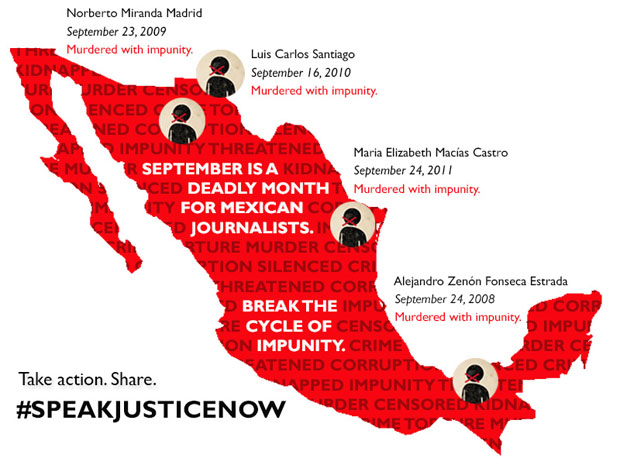 This September marks the anniversary of the murders of four Mexican journalists. Alejandro Zenón Fonseca Estrada, Norberto Miranda Madrid, Luis Carlos Santiago and Maria Elizabeth Macías Castro were each killed within a year of each other, from 2008 to 2011. They were all covering drug cartels and corruption, and not a single person has been brought to justice in these murder cases.
This September marks the anniversary of the murders of four Mexican journalists. Alejandro Zenón Fonseca Estrada, Norberto Miranda Madrid, Luis Carlos Santiago and Maria Elizabeth Macías Castro were each killed within a year of each other, from 2008 to 2011. They were all covering drug cartels and corruption, and not a single person has been brought to justice in these murder cases.
Alejandro Zenón Fonseca Estrada, 33, host of a popular morning call-in show called “El Padrino Fonseca” (The Godfather Fonseca) was gunned down on September 24, 2008, by unidentified men as he was hanging up anti-violence posters.
Norberto Miranda Madrid, 44, was a Web columnist and host for the online station Radio Visión. He was shot multiple times by two masked gunmen in the offices of the radio station on September 23, 2009.
Luis Carlos Santiago worked as a photographer with the local daily El Diario. On September 16, 2010, he was shot and killed by unidentified gunmen. He was 21.
Maria Elizabeth Macías Castro, 39, tweeted about activities of criminal groups and covered the topic on the website Nuevo Laredo en vivo (Nuevo Laredo Live) using the pen name “La NenaDLaredo” (The girl from Laredo). On September 24, 2011, her decapitated body was found with a note that identified the website and her pseudonym.
Speak Justice Now is a campaign against impunity by the Committee to Protect Journalists. We encourage you to join thousands around the world to tweet Mexican President Enrique Peña Nieto today demanding an end to impunity using the hashtag #SpeakJusticeNow.
24 Sep 13 | Europe and Central Asia, Italy
The European Court of Human Rights have today ruled in favour of an Italian journalist sued for defamation, citing Article 10 of the European Convention on Human Rights which protects the right to freedom of expression.
Maurizio Belpietro was convicted in Italy on defamation charges for a story published in national newspaper Quotidiano Nazionale in 2004, when he was paper’s director. The story, penned by an Italian senator, accused Italian judges and prosecutors ‘of using political strategies in their fight against the Mafia.’
Two prosecutors sued both Belpietro and the senator in question, arguing the article was defamatory. The latter was acquitted on the basis that he had written the article in his role as a senator. Belpietro, while also initially acquitted, was in 2009 given a suspended 4-month jail sentence, as well as being ordered to pay substantial sums to the plaintiffs. His appeal was dismissed in 2010.
Belpietro took the case to the European Court of Human Rights, which today ruled that the conviction was in violation of Article 10. He was awarded €10,000 in non-pecuniary damage and €5,000 for costs and expenses.
23 Sep 13 | News and features

Brad Camembert / Shutterstock.com
It never occurred to me, when I started to write that what I was writing was controversial. Much of it grew out of my own feelings and concerns when I was young.
There were few challenges to my books then, although I remember the night a woman phoned, asking if I had written Are You There God? It’s Me, Margaret. When I replied that I had, she called me a communist and slammed down the phone. I never did figure out if she equated communism with menstruation or religion, the two major concerns in 12-year-old Margaret’s life.
But, in 1980, the censors crawled out of the woodwork, seemingly overnight, organised and determined. Not only would they decide what their children could read, but what all children could read. Challenges to books quadrupled within months, and we shall never know how many teachers, school librarians and principals quietly removed books to avoid trouble.
Censorship grows out of fear and, because fear is contagious, some parents are easily swayed. Book banning satisfies their need to feel in control of their children’s lives. This fear is often disguised as moral outrage. They want to believe that if their children do not read about it, their children will not know about it. And if they do not know about it, it will not happen.
Today, it is not only language and sexuality (the usual reasons given for banning my books) that will land a book on the censors’ hit list. It is Satanism, New Age-ism and a hundred other ‘isms’, some of which would be laughable if the implications were not so serious. Books that make kids laugh often come under suspicion; so do books that encourage kids to think, or question authority; books that don’t hit the reader over the head with moral lessons are considered dangerous.
My book Blubber was banned in Montgomery County, Maryland, for ‘lack of moral tone’ and, more recently, challenged in Canton, Ohio, for allowing evil behaviour to go unpunished. But in New Zealand it is used in teacher-training classes to help explain classroom dynamics. Censors do not want children exposed to ideas different from their own. If every individual with an agenda had his or her way, the shelves in the school library would be close to empty.
But I am encouraged by a new awareness. This year I have received a number of letters from young people who are studying censorship in their classes. And in many communities across the country, students from elementary through to high school are becoming active (along with caring adults) in the fight to maintain their right to read and their right to choose books. They are speaking before school boards, and, more often than not, when they do, the books in question are returned to the shelves.
Only when readers of all ages become active, only when readers are willing to stand up to the censors, will the censors get the message that they cannot frighten us.
Judy Blume writes books for readers of all ages. This article was first published in Index on Censorship magazine in 1993
To subscribe to Index on Censorship magazine, including free access to our archive, click here
23 Sep 13 | News and features
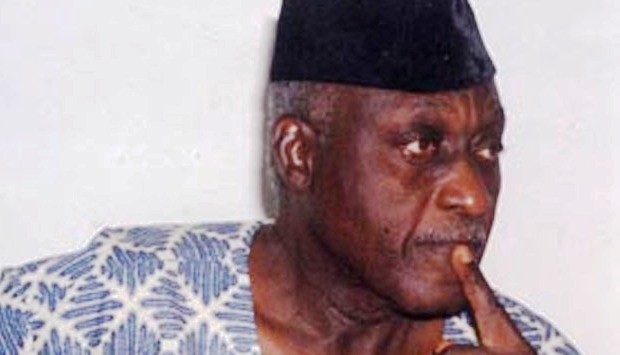
From “Africa’s Subversive Litanies” – Robert Fraser, Index on Censorship Magazine, October 1980
In contemporary West Africa the writer’s shell may occasionally be of his own making, the artifact of inhibition or doubt. Often, however, it is made of harder stuff, as Kofi Awoonor, one of Ghana’s senior poets, discovered to his cost. He was detained in 1977 for suspected collusion in an abortive attempt to remove a government which was itself the product of a military uprising.
The extent of Awoonor’s guilt was giving temporary shelter to a fellow Ewe out of favour with the authorities. Yet at his trial thirteen defence barristers failed to secure his release; their evidence was declared inadmissible before the proceedings had even started. Awoonor’s subsequent detention in Usher Fort did little to mitigate the acute political scepticism which had
earlier driven him to seek asylum in America. He captured the feeling with characteristically sardonic sadness in his poem ‘When My New Passport Came and I was given a Year’:
Oh, I know you curse my name
and say that I have fled; you call for
silence from my parched winter lips;
I received the other day your passport
with the one year stamp
and the order that I cannot renew
myself in alien lands.
But I renew myself here
in winter’s beginning day
awaiting the coming of the sun
so that your son will be ready
for the snake-shrouds of homecoming.
23 Sep 13 | News and features, Politics and Society, South Africa
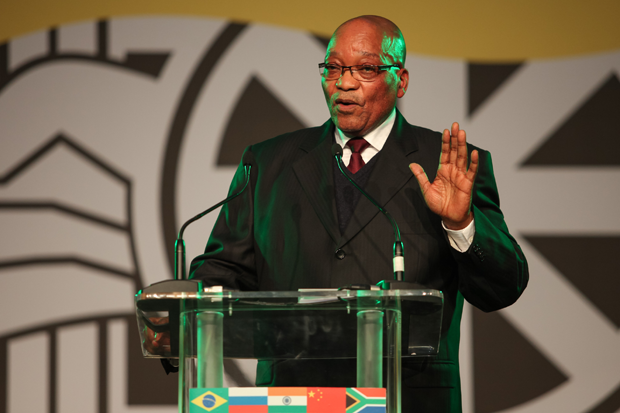
Jacob Zuma (Photo: Jordi Matas / Demotix)
South Africa’s ruling African National Congress (ANC) has changed tack in its campaign to curtail the media. In a turn to what could be called “censorship lite”, the iron fist of state security intervention is being augmented by the velvet glove of calls for “patriotic” journalism.
After President Jacob Zuma’s ascendancy to the highest position in the ANC in 2007, various attacks have been launched on the private and public media. While factional battles for political control were being fought at the public broadcaster, an investigative journalist was illegally arrested after exposing corruption involving the newly appointed police commissioner. Despite concerted resistance across the social spectrum, the Protection of State Information Bill (dubbed the “Secrecy Bill”) was adopted, which will all but stop whistle blowing and investigate journalism into state corruption. And a media appeals tribunal has been mooted that could mete out punishments ranging from fines to jail time to media houses and individual journalists who offend politicians. While Zuma has referred the Secrecy Bill back to parliament for minor adjustments before signing it into law, the establishment of the tribunal is due to be considered by the country’s parliament, as per a policy decision of the ANC.
In recent times, individuals known to be close to Zuma and the ANC have gained greater influence in the media. This development seems to have precipitated a new softly-softly approach of edging the private media towards news reporting that is more amenable to dominant political interests. Zuma recently made a call for “patriotic journalism” which dovetails with a number of other initiatives by his allies in the media. The public broadcaster and two private media companies have all vowed to shift the media away from reporting on the “opposite of the positive”, as Zuma put it.
Zuma’s call was made in an off-the-cuff address at parliament. He told journalism students that, “When I go out, people envy South Africans, they wish they were South Africans because they say we are doing so well, we are succeeding… they love it. But when I am in South Africa, every morning you feel like you must leave this country because the reporting concentrates on the opposite of the positive.”
He asked the students: “Who do you think in reality you serve when reporting: the interest of the public that you claim, as the media you stand for, or the interest of the owners and managers of the paper? What is it that you think is happening, particularly in a country that is supposed to be an example with vibrant democracy, transparency, high morals, everything. How do we handle this?” Zuma expressed the hope that the South African media would learn from Mexico’s “patriotic journalism” which avoids reporting on crime and rather “markets” the country to foreigners.
His utterances follow a call by the acting chief operating officer of the South African Broadcasting Corporation (SABC), Hlaudi Motsoeneng, that 70% of the public broadcaster’s news reports should be positive. He told the Mail and Guardian that, “we want to concentrate more on positive stories, rather than to put everything in a negative way. Before you become a manager at the SABC, you first have to be a citizen of this country. You should love this country… The message I put out very strongly at the SABC is to think about the positive when people go out and do stories. The difference is our own citizens are tired of crime and tired of people talking about negative things.” Motsoeneng is a known Zuma acolyte who has controversially held onto his post after being dismissed by the previous SABC board.
Meanwhile, businessman Iqbal Survé, who enjoys close ties with the ANC, became the new owner of Independent News & Media, which comprises the largest collection of English-language daily and weekly newspaper titles in the country. He explained part of the rationale for the purchase as being: “We felt the media was not representing the positive aspects of South Africa. What we are reading about is not what we see in South Africa.”
During this same period, Indian business associates and friends of the Zuma family launched ANN7, a new satellite news service. The Gupta family recently provoked outrage for using a military air base near South Africa’s capital Pretoria to fly in guests from India for a private wedding function. The former head of government communications, Jimmy Manyi, hosts a talk show on the channel. Manyi is no stranger to controversy, having spearheaded attacks against the media during his time as government spokesperson, such as using state advertising spending to put pressure on media outlets. In an interview about his new job as talk show host, he declared South Africans to be tired of negative press and that ANN7 will provide an alternative.
ANN7’s broadcasts have been riddled with more than the usual share of start-up problems, leading to much ridicule. The company also had to withdraw a billboard advertisement describing competitors as “old farts”, after a complaint from the South African Older Persons Forum. Postings of “ANN7 bloopers” on YouTube led to a copyright complaint from ANN7 and the removal of the clips, but they can still be viewed elsewhere.
The mirth that greeted ANN7 was also evident in responses to Zuma’s call, both in articles and tweets. More serious critiques included an article from Media Monitoring Africa, while others pointed out that Mexico has one of the worst press freedom records in the world.
Thus far, velvet glove of censorship lite has not succeeded in massaging the established private media into a more “patriotic” stance. This may change when the iron fist of criminalisation of critical journalism finally comes crashing down.
This article was originally posted on 23 Sept 2013 at indexoncensorship.org
20 Sep 13 | Africa, News and features, Uganda
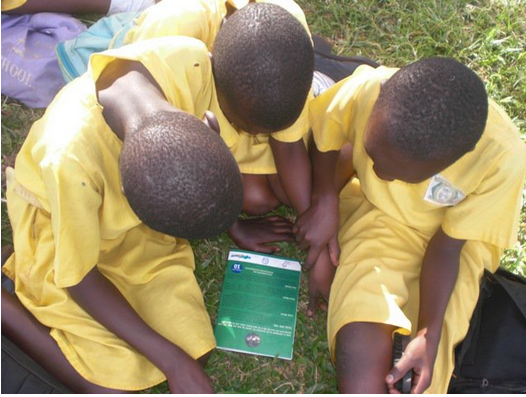 The heroine of The Little Maid, Viola, is an eight-year-old Ugandan girl who lives with her destitute grandmother and dreams of going to school. Instead, she is sent to live with her aunt, who promises to pay her school fees if Viola works for her first. Viola becomes a maid, forced to wash clothes, scrub the bathroom, cook and live in servants’ quarters. But every day when her cousins’ tutor arrives, she crawls underneath the dining room table to eavesdrop on the lessons. Eventually Viola learns to read and write and escapes the clutches of her evil aunt, who is found guilty of child abuse and child slavery and ordered to school her niece.
The heroine of The Little Maid, Viola, is an eight-year-old Ugandan girl who lives with her destitute grandmother and dreams of going to school. Instead, she is sent to live with her aunt, who promises to pay her school fees if Viola works for her first. Viola becomes a maid, forced to wash clothes, scrub the bathroom, cook and live in servants’ quarters. But every day when her cousins’ tutor arrives, she crawls underneath the dining room table to eavesdrop on the lessons. Eventually Viola learns to read and write and escapes the clutches of her evil aunt, who is found guilty of child abuse and child slavery and ordered to school her niece.
It could be a true story. In Uganda there are an estimated 2.75 million children engaged in work, although not many of those will have the happy ending. But The Little Maid is a work of fiction, written by Oscar Ranzo, a Ugandan social worker turned author who has penned five children’s books. Now, The Little Maid is being distributed to schools across the country low-cost (5,000 Ugandan shillings or $1.90 each) through his Oasis Book Project. The project aims to improve the reading and writing culture in Uganda and provide school-children with entertaining but educational stories to which they can relate. Ranzo sells most of his books to schools, with the proceeds used to publish more titles. However, he also donates copies to more impoverished areas.
In 1969, Professor Taban Lo Liyong, one of Africa’s best-known poets and fiction writers, declared Uganda a ‘literary desert’. “What we want to do with this project is create an oasis in the desert,” explains Ranzo. “That’s why I called it the Oasis Book Project.”
The small print
Excluding textbooks, there are only about 20 books published in Uganda annually. According to a study last year by Uwezo, an initiative aimed at improving competencies in literacy and numeracy among children aged six to sixteen years in East Africa, more than two out of every three pupils who had finished two years of primary school failed to pass basic tests in English, Swahili or numeracy. For children in the lower school years, Uganda recorded the worst results.
Growing up in the 1970s and 1980s, Ranzo was privileged to have a grandfather who had a library and attended a private school that held an after class reading session. He was a particularly avid fan of Enid Blyton’s Famous Five series.
“But Mum was a nurse and she wanted me to be a doctor. I wanted to pursue literature and she told me ‘no you can’t do that’, so I did sciences,” says Ranzo, stressing that literature, which remains optional in secondary school, is not taken seriously in Uganda.
Furthermore, many local publishers do not see writing fiction as profitable. “They’d rather publish textbooks and get the government to buy them,” Ranzo explains.
His books are available in two central Kampala bookshops for 8,000 shillings ($3). But in the past 15 months fewer than 20 have moved from the shelves, while he has sold over 3,000 to 20 schools in three districts.
Fiction imitating life
Saving Little Viola, his first book in which the female protagonist, Viola, was introduced, was published in 2011 by NGO Lively Minds. The story ends with Viola being saved by her best friend from two men who want to use her for a ritual sacrifice. UNICEF funded its distribution to 36 primary schools across Uganda as part of a child sacrifice awareness programme.
The primary aim of the Oasis Book Project is to encourage reading, although Ranzo admits he would like people to discuss his stories, which have themes close to his heart. Children being forced into work, the theme of The Little Maid, is something he has witnessed himself.
“Many kids are brought from villages to work as maids in homes in towns or cities, and the treatment they are subjected to is terrible in many cases,” says Ranzo.
His next book, The White Herdsman, which will be released in 2014, deals with the impact of oil production on communities, a timely subject for Ugandans with oil production expected to start in 2016. The book tells the story of a village where water in the well has turned black after an oil spill. A witchdoctor blames the disaster on an albino child.
Ranzo’s stories have been welcomed at Hormisdallen Primary, a private school in Kamwokya, Kampala. English teacher Agnes Kasibante, speaking to Think Africa Press, praises the book’s impact. “It’s actually a big problem in Uganda, most children don’t know how to read. At least those books give them morale to continue loving reading,” she says.
Ranzo has also penned Cross Pollination, a collection of fictional stories for adults about the spread of HIV in a community. According to a recent report, Uganda may not meet its target to increase adult literacy by 50% by 2015.
“I’ve worked in a big multinational company where people have jobs but they can’t write. Reading can help develop this,” says Ranzo, who is currently attending the University of Iowa’s 47th annual International Writing Program (IWP) Fall Residency.
Uganda’s literary comeback
Jennifer Makumbi, 46, a Ugandan doctoral student at Lancaster University, is one of a new generation of Ugandan authors. She won the Kwani Manuscript Project, a new literary prize for unpublished fiction by Africans, for her novel The Kintu Saga. She said Taban Lo Liyong’s description of Uganda as a literary desert was “heartbreaking, especially as in the 1960s Uganda seemed to be poised to be a leading literary producer”.
“But perhaps it is exactly this description that is pushing Ugandans to write in the last ten years,” she continues. “Yes, we have not caught up with West Africa yet but… there are quite a few wins.” In recent years, two female Ugandan authors, Monica Arac de Nyeko and Doreen Baingana, won the Caine Prize for African Writing and the Commonwealth Writers’ Prize respectively. Makumbi’s Kwani prize adds her to a list of eminent Ugandan authors.
Makumbi is optimistic about the future of Ugandan literature: “These I believe are indications that Uganda is on its way.”
This article was originally published on 17 Sept 2013 at Think Africa Press and is reposted here by permission.
20 Sep 13 | News and features

(Photo illustration: Shutterstock)
Freedom of expression is protected by the German Constitution and basic laws. There is room for improvement, with Germany’s hate speech and libel laws being particularly severe.
Germany’s biggest limits on freedom of expression are due to its strict hate speech legislation which criminalises incitement to violence or hatred. Germany has particularly strict laws on the promotion or glorification of Nazism, or Holocaust denial with paragraph 130(3) of the German Criminal Code stipulating that those who ‘publicly or in an assembly approve, deny, or trivialise’ the Holocaust are liable to up to five years in prison or a fine. Hate speech also extends to insulting segments of the population or a national, racial or religious group, or one characterised by its ethnic customs.
Germany still has strict provisions in the criminal code providing penalties for defamation of the President, insulting the Federal Republic, its states, the flag, and the national anthem. However, in 2000, the Federal Constitutional Court stated that even harsh political criticism, however unjust, does not constitute insulting the Republic.
Freedom of religious expression is compromised through anti-blasphemy laws criminalising ‘offences related to religion and ideology’. Paragraph 166 of the Criminal Code prohibits defamation against ‘a church or other religious or ideological association within Germany, or their institutions or customs’. While very few people (just 10) have been convicted under the blasphemy legislation since 1969, the impact of hate speech legislation is seen more frequently, in particular in the prosecution of religious offences. In 2006, a pensioner in the state of North Rhine-Westphalia was given a 1-year suspended sentence for printing ‘The Koran, the Holy Koran’ on toilet paper, and sending it to 22 Mosques and Muslim community centres. In 2011, nine of the 18 operators of the far right online radio programme ‘Resistance Radio’ were given between 21 months and three years in prison for inciting hatred.
Germany has also seen heated debate over a widespread ban on religious symbols in public workplaces, especially affecting Muslim women who wear headscarves.
Half of Germany’s 16 states have, to various extents, banned teachers and civil servants from wearing religious symbols at work. Yet this is not applied equally to all religions; five states have made exceptions for Christian religious symbols.
Media freedom
Government and political interference in the media sector continues to raise concerns for media independence, with several incidents of interventions by politicians attempting to influence editorial policy. In 2009, chief editor of public service broadcaster ZDF, Nikolaus Brender saw his contract terminated by a board featuring several politicians from the ruling Christian Democratic Union. Reporters Without Borders labelled it a ‘blatant violation of the principle of independence of public broadcasters.’ In 2011, the editor of Bild, the country’s biggest newspaper, received a voicemail message from President Christian Wulff, who threatened ‘war’ on the tabloid which reported on unusual personal loan he received.
Media plurality is strong among regional newspapers though due to financial pressure, media plurality declined in 2009 and 2010. Germany has one of the most concentrated TV markets in Europe, with 82% of total TV advertising spend shared among just two main TV stations in Germany. This gives a significant amount of influence to just 2 broadcasters and the majority of Germans still receive their daily news from the television.
The legal framework for the media is generally positive with accessible public interest defences for journalists in the law of privacy and defamation. However, Germany still has criminal provisions in its defamation law, which although unused, remain in the penal code. Germany’s civil defamation law is medium to low cost in comparison with other European jurisdictions, places the burden of proof on the claimant (a protection to freedom of expression) and contains a responsible journalism defence, although not a broader public interest defence.
Digital
The digital sphere in Germany has remained relatively free with judicial oversight over content takedown, protections for online privacy and a high level of internet penetration (83% of Germans are online). Germany’s Federal Court of Justice has ruled that access to the internet is a basic right in modern society. Section 184b of the German Penal Code ‘states that it is a criminal offense to disseminate, publicly display, present or otherwise make accessible any pornographic material showing sexual activities performed by, on or in the presence of a child.’ Germany has also ratified and put into the law the Council of Europe’s Convention on Cyber Crimes from 2001. Mobile operators also signed up to a Code of Conduct in 2005, which includes a commitment to a dual system of identification and authentication to protect children from harmful content. This was reaffirmed and made binding in 2007.
There are concerns over the increased use of surveillance of online communications, especially since a new antiterrorism law took effect in 2009.
In 2011, German authorities acquired the license for a type of spyware called FinSpy, produced by the British Gamma Group. This spyware can bypass anti-virus software and can extract data from the device it is targeting. Two reports by the German Parliamentary Control Panel, from 2009 and 2010, stated that several German intelligence units had monitored emails with the amount of surveillance increasing from 7 million pieces items in 2009 to 37 million in 2010. However, Germany’s Constitutional Court ruled in February that intelligence agencies are only allowed to collect data secretly from suspects’ computers if there is evidence that human lives or state property are in danger and the authorities must get a court order before they secretly upload spyware to a suspect’s computer.
Germany’s tough hate speech legislation also chills free speech online. In January 2012, Twitter adopted a new global policy allowing the company to delete tweets if countries request it, meaning that tweets become subject to Germany’s hate speech laws. The latest Twitter transparency report states that German government agencies asked for just 2 items to be removed. In October 2012, Twitter also blocked the account of a far-right group, Better Hannover, after a police investigation.
Artistic freedom
Artists can work relatively freely in Germany. Freedom of expression in arts is protected under the Constitution, and is largely respected, especially for satire or comedy. Yet, the freedom of expression of artists is chilled through strict hate speech and blasphemy laws.
The German authorities very rarely use blasphemy laws against artists. However, there have been several examples of art being subjected to censorship due to religious offence. In 2012, at the exhibition ‘Caricatura VI – The Comic Art – analog, digital, international’ in Kassel, a cartoon created by cartoonist Mario Lars was removed after protests that it offended religious sensibilities.
There is persistent sensitivity around artistic works depicting the Nazi period. In April 2013, the German version of an Icelandic author’s book was ‘censored’ by its publisher, who cut 30 chapters from Hallgrímur Helga’s novel, ‘The woman at 1000°’. Key passages about Hitler, concentration camps and SS were censored to fit the German market.
19 Sep 13 | Belarus
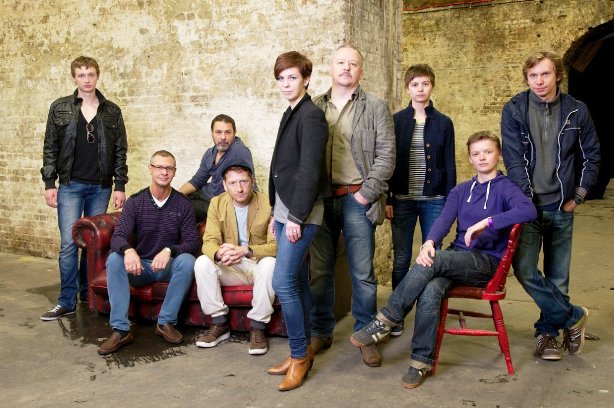 This week, all 25 members of Belarus Free Theatre were in London ready to start their rehearsal for King Lear at the Globe, back after its triumph at the Globe to Globe Festival last year. The company is split between those living precariously in exile in London, and the rest who continue to work illegally and underground under appalling, oppressive conditions back in Minsk and getting everyone together is fraught with difficulties and danger.
This week, all 25 members of Belarus Free Theatre were in London ready to start their rehearsal for King Lear at the Globe, back after its triumph at the Globe to Globe Festival last year. The company is split between those living precariously in exile in London, and the rest who continue to work illegally and underground under appalling, oppressive conditions back in Minsk and getting everyone together is fraught with difficulties and danger.
Seeing them all together at a fundraising event in central London, they looked like a group of young actors anywhere in the world. But in order to get here, 20 of them had to be smuggled out of the country, taking different routes across the multiple borders of the land-locked country to fly from Vilnius, Riga, Warsaw, Kiev or Moscow to London. And the whole trip seemed in jeopardy when on Saturday night, their underground performance in Minsk was raided by the police. This is the first time that the performances have been raided since early July. The police usually just take down everyone’s details as they leave the show. But the significance of this raid was that they stopped the show mid-performance, taking down the actor’s audiences names and passport numbers before letting them go home.
They have been working out of the same small house, teaching students, rehearsing performing for their shows for several years now. But after this raid the actors feel it will not be long before they are unable to use the building. Finding a new building is extremely difficult because it means finding someone brave enough to rent their space to an illegal theatre company.
19 Sep 13 | Europe and Central Asia, Greece, News and features
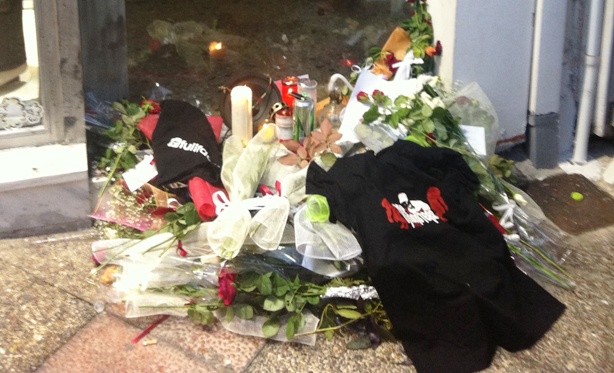
Tributes to murdered activist Pavlos Fyssas (pic: Christos Syllas-Dellis)
Thousands of protesters gathered on Wednesday evening in Athens near the place where Pavlos Fyssas, a 34 year-old antifascist hip hop artist was murdered by a Golden Dawn supporter.
“The blood is running, it seeks revenge”, they shouted, a slogan echoing the December 2008 riots , when 15 year-old student Alexandros Grigoropoulos was killed by two policemen.
The 45 year-old man who carried out the stabbing has told police that he was a supporter of far-right party Golden Dawn. This was clearly a politically motivated killing, added to a sequence of intimidation events and attacks carried out by Golden Dawn against immigrants and asylum seekers.
On 17 January, Shehzad Luqman, an immigrant worker from Pakistan was lethally stabbed by two men. Police later found pre-election pamphlets of Golden Dawn in the house of one perpetrator.
In December 2012, Amnesty International reported on this issue. In addition, Human Rights Watch has found that there is evidence connecting the attackers on immigrants with members of or affiliated with far-right groups such as Golden Dawn.
No matter how useful these findings may be, they were clearly not at the “agenda” of the rally at Keratsini. Young and old antifascists, together with immigrants, have been increasingly struggling with Golden Dawn vigilantes in the past five years. The murder of Fyssas comes as no surprise. A lot of people somehow anticipated the tragic event.
“The regime, in co-operation with Golden Dawn is clearly escalating the confrontation with political dissidents. This is why we’re here today. And we have to step up the intensity of this political struggle. Everywhere,” said a demonstrator, local resident of Keratsini.
Some 3,000 – 4,000 members of an organised anarchist block was heading towards Golden Dawns’ offices in Nikaia, while at the same time, demonstrators attacked Keratsini’s police station. Almost instantly clashes began: Riot police squads tried to disperse groups of demonstrators with the typical use of excessive force.
In an alley, the head of a police squad was heard shouting “Come on, let’s go and fuck them up”. Middle-aged people from the neighborhood curesed them, while young antifascists threw Molotov cocktails and stones.
Keratsini district, a working class neighborhood, was established after Greek refugees fled Asia Minor on 1922. The greater area of Piraeus (Nikaia, Perama, Keratsin), known for its anti-Nazi struggle, was historically affiliated with the political left.
This picture though seems to be fading away. According to polling company “Public Issue”, Golden Dawn has doubled its electoral influence on these areas. Moreover, it has worked its way on socially penetrating existing political views.
On June 2012, Egyptian fishermen were attacked in Perama after an inflammatory and racist speech by Golden Dawn MP Yannis Lagos, who said that the party would hold them accountable for their actions. A few days ago, again in Perama, members of the Communist Party (KKE) were brutally attacked by Golden Dawn’s supporters while putting up posters for an upcoming festival.
Last nights’ clashes have led to a total of 130 detentions and 34 arrests while tweeters were reporting a demonstrator had been heavily injured by a direct teargas shot. Questions about the way police responded at the place of the assassination remain unanswered. Witnesses on TV broadcasts this morning said that police were reluctant to involve at the fight before the stabbing.
There were protests against the murder throughout the country. Latest reports suggest that there have been discussions on emergency legislation to ban Golden Dawn’s acts.
This article was originally published on 19 Sept 2013 at indexoncensorship.org
19 Sep 13 | Digital Freedom, News and features, Politics and Society, United States
David Carr recently reported in the New York Times that journalist Barrett Brown could face a 100-year prison term if he’s found guilty for linking to stolen information. He didn’t steal this information himself, nor did he post it online. He simply linked to it.
Brown is a dogged journalist who has done important and revealing reporting on the business of surveillance. His work has appeared in BusinessWeek, the Guardian, the Huffington Post and Vanity Fair. He has also served at times as a self-appointed spokesman for Anonymous, the leaderless Web collective of hackers and activists.
As a victim, he’s imperfect, Carr writes. Brown has struggled with substance abuse and by all accounts hasn’t always been easy to get along with. For example, he threatened an FBI agent and his family by name in a video he posted to YouTube.
Brown came to the government’s attention when he linked in a chat room to material Anonymous had posted online.
In recent years, Anonymous has hacked into the computer systems of a number of intelligence and surveillance firms who contract with the government and the biggest corporations. These firms helped craft elaborate campaigns to attack and discredit activists and journalists on behalf of corporate clients and have received huge government contracts for other projects.
By all accounts, Brown doesn’t have the technical ability or knowhow to have participated in the hacking that exposed these documents. But once they were released, Brown set up a research organization, Project PM, to sort through the documents and report on what they contained.
“The files contained revelations about close and perhaps inappropriate ties between government security agencies and private contractors,” Carr writes. But they also contained credit-card information and private emails.
When Brown linked to these files in a chat room, he “provided access” to stolen information, the government says. Prosecutors charged him with 12 counts related to identity theft.
The notion that linking to stolen material makes the linker a party to the original crime is absurd. And the severity of the charges is clearly meant to send a message to journalists and whistleblowers everywhere. Viewed in light of the Chelsea Manning case and the Edward Snowden leaks, the Brown case appears part and parcel of the government’s crackdown on activists who leak information and the journalists who report on them.
Carr reminds us that journalists frequently link to stolen documents. The Times’ most recent articleon the Snowden documents did so. The Electronic Frontier Foundation also points to a leak of congressional staffer passwords that many news organizations linked to. And this practice is only likely to expand.
“News organizations in receipt of leaked documents are increasingly confronting tough decisions about what to publish,” Carr writes, “and are defending their practices in court and in the court of public opinion, not to mention before an administration determined to aggressively prosecute leakers.”
The Committee to Protect Journalists responded in more forceful terms, arguing that the government’s handling of this case “threatens the nature of the Web, as well as the ethical duty of journalists to verify and report the truth.”
Indeed, in the U.S. and the U.K. we’ve seen shocking efforts to harass and intimidate journalistsworking on national security and surveillance issues. The Barrett Brown case follows a similar narrative.
When Brown posted the link to the Anonymous documents in a chat room, the government tracked him down at his mother’s home and tried to seize his laptop. When he and his mother refused to hand over the computer, the FBI threatened to throw Brown’s mother in jail. Here’s how the Guardian’s Glenn Greenwald describes the harassment:
Over the next several months, FBI agents continued to harass not only Brown but also his mother, repeatedly threatening to arrest her and indict her for obstruction of justice for harboring Brown and helping him conceal documents by letting him into her home.”
Brown’s mother eventually pled guilty but has yet to be sentenced. Brown lashed out at the FBI, threatening one agent by name, in the video he posted to YouTube. Those threats gave the FBI cause to arrest Brown and he has been in custody ever since.
While threats of this sort should be taken seriously, so too should the ongoing harassment of journalists and their families.
The New York Times story on Barrett Brown is important because it comes on the heels of a gag order that prohibits people involved in his case from speaking to the press. The legal fees for the case are expected to exceed $200,000 and an activist has established a defense fund.
Links are the connective tissue of the Internet. They enable us to share news, discover new information, dig deeper into issues and give credit to sources. The government’s effort to criminalize linking is akin to rewiring how the Internet works. It will have a chilling effect on how journalists report on sensitive government matters.
This case also has a bearing on all of us who post links to Facebook, tweet articles or blog about the news of the day.
This article was originally posted on 13 Sept 2013 at freepress.net and is reproduced here by permission.






 The heroine of
The heroine of 
 This week, all 25 members of Belarus Free Theatre were in London ready to start their rehearsal for King Lear at the Globe, back after its triumph at the Globe to Globe Festival last year. The company is split between those living precariously in exile in London, and the rest who continue to work illegally and underground under appalling, oppressive conditions back in Minsk and getting everyone together is fraught with difficulties and danger.
This week, all 25 members of Belarus Free Theatre were in London ready to start their rehearsal for King Lear at the Globe, back after its triumph at the Globe to Globe Festival last year. The company is split between those living precariously in exile in London, and the rest who continue to work illegally and underground under appalling, oppressive conditions back in Minsk and getting everyone together is fraught with difficulties and danger.
